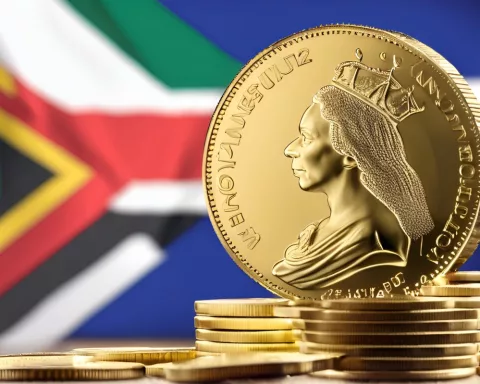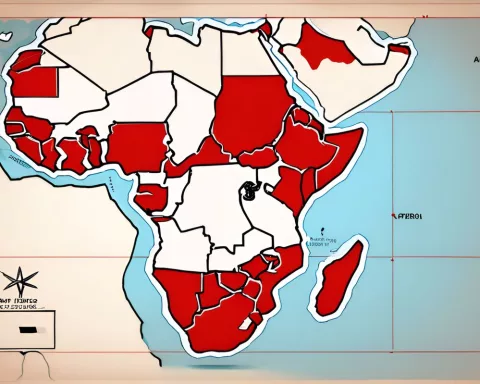Forex trading is like swapping one country’s money for another to make a profit when values change. It’s super popular in Africa, especially among young people aged 18 to 25, with trading activities skyrocketing by 450%. This exciting market operates around the clock, allowing traders to buy low and sell high on currencies like the US dollar and South African rand. With many young Africans getting involved, including more women, Forex is opening doors to financial opportunities across the continent. As traders learn the ropes, they find ways to manage risks and spot chances to grow their wealth in this bustling market.
What is Forex Trading and How Does it Work?
Forex trading involves the exchange of one currency for another to profit from fluctuations in currency values. Operating 24/5, traders buy low and sell high, focusing on currency pairs like USD/ZAR. With a daily turnover exceeding $6 trillion, it’s the largest financial market globally.
A Youthful Demographic Drives Growth
Forex trading has seen a dramatic uptick in Africa over recent years, largely driven by the continent’s young population, particularly those aged 18 to 25. Leading forex brokers, such as Tickmill, have observed a staggering 450% rise in trading activities. This trend suggests a significant shift towards financial ventures among young African traders, including a growing number of women in this traditionally male-dominated field.
The Essentials of Forex Trading
Understanding Forex Trading
At its core, Forex trading involves the exchange of one currency for another, with the aim of capitalizing on the fluctuations in currency values. This dynamic market operates 24 hours a day, five days a week, allowing traders to speculate on currency pair prices, such as USD/ZAR (US Dollar/South African Rand) or EUR/NGN (Euro/Nigerian Naira). The concept is simple: buy a currency at a lower price and sell it at a higher price, or the reverse, depending on global supply and demand dynamics. Remarkably, Forex markets see a daily turnover exceeding $6 trillion, making it the largest financial market in the world.
The Legal Framework in Africa
Legality and Regulation Across the Continent
Forex trading is legally recognized in many African countries, though the level of regulation varies. South Africa, for example, has strong oversight from the Financial Sector Conduct Authority (FSCA), ensuring a secure trading environment. Other African countries are in the process of refining their regulatory systems or lack specific Forex trading legislation. It’s crucial for traders to verify local regulations and engage only with brokers who are licensed by the relevant authorities.
Regulatory Bodies Shaping the Market
Regulators across Africa are essential in fostering a supportive environment for Forex trading. They set firm regulations to protect traders and enhance market trust. In South Africa, the FSCA requires brokers to secure licenses and adhere to strict operational standards. Similarly, Nigeria’s Central Bank of Nigeria (CBN) and the Securities and Exchange Commission (SEC) oversee the Forex market, creating rules to shield traders from fraudulent activities. These measures not only build investor confidence but also ensure sustainable market growth.
Insights into the African Forex Market
The Structure and Functioning of the Market
In the vibrant Forex landscape, currency pairs are the main attractions, representing one currency’s value against another. Traders engage with ‘major pairs’ involving significant currencies like the US dollar paired with the Euro, and ‘exotic pairs’ that include a major currency and a developing economy’s currency, such as USD/ZAR. Prices depend on exchange rates between these currencies, with traders dealing with two main prices: the ‘bid’ price for selling and the ‘ask’ price for buying the base currency. The ‘spread,’ or the difference between these prices, significantly impacts trade profitability.
The Forex market operates in a decentralized manner, relying on a global network of computers and brokers, rather than a central exchange. This setup ensures high liquidity, allowing traders to execute large trades without significantly affecting market prices.
Central Banks and Economic Policies
Central banks play a critical role in Forex markets by setting monetary policies that influence currency strength. Tools such as interest rate adjustments and open market operations can either boost or diminish a currency’s attractiveness, depending on economic goals. For instance, higher interest rates can attract investors seeking better returns, leading to currency appreciation. Conversely, quantitative easing can increase the money supply and potentially weaken the currency.
Government economic policies also affect Forex trading. Fiscal stimulus, austerity measures, and other policies can shift market dynamics. Traders closely monitor policy announcements and economic reports to anticipate market movements. In Africa, central banks like South Africa’s Reserve Bank (SARB) and Nigeria’s CBN are key players in managing the continent’s major currencies.
Getting Started with Forex Trading in Africa
Choosing the Right Broker
Selecting the right broker is paramount when venturing into Forex trading. Ensure that the broker is regulated by a reputable authority, such as South Africa’s FSCA or international bodies like the UK’s FCA or CySEC in Cyprus. This step safeguards your investments. Additionally, consider the broker’s offerings, including a user-friendly trading platform, educational resources, and responsive customer service. These factors are crucial for beginners and can significantly influence the trading journey. Testing their services with a free demo account allows you to experience their platform and evaluate their offerings without financial risk.
Essential Tools and Platforms
African traders need robust tools and platforms for effective trading. Essential tools include live quotes, quality analysis software, advanced charting capabilities, and real-time financial news. Many brokers provide access to MetaTrader 4 (MT4) and MetaTrader 5 (MT5), known for their powerful analytical features and flexible trading systems. Another popular platform, cTrader, offers an intuitive interface and advanced order functionalities. These platforms are indispensable for serious traders who are ready to invest time in mastering advanced tools.
Strategies for Successful Forex Trading
Combining Fundamental and Technical Analysis
Blending fundamental and technical analysis can greatly improve your Forex trading skills. Fundamental analysis looks at economic indicators, central bank decisions, political events, and other macroeconomic factors that influence currency values. Key metrics such as GDP growth rates, inflation, employment figures, and trade balances provide insights into a country’s economic health and currency strength.
Technical analysis, on the other hand, involves interpreting charts and graphs to identify trends and patterns. Techniques include analyzing moving averages, support and resistance levels, candlestick formations, and Fibonacci retracements. These tools help predict future market movements. Merging insights from both analyses equips traders with a comprehensive toolkit for making informed trading decisions.
Risk Management and Leverage
Effective risk management acts as a safety net in Forex trading, preventing financial disaster. By defining your risk tolerance for each trade and adhering to a strict risk-reward ratio, you create a framework to remain solvent even during losing streaks. Leverage can be a double-edged sword: it amplifies your purchasing power, allowing control over larger positions with minimal capital, but it also magnifies potential losses. Understanding that leverage can boost profits, it is crucial to manage it wisely to avoid significant losses if the market moves against you.
Leverage should be used judiciously. Effective risk management doesn’t aim to eliminate risks but to understand, control, and mitigate them, ensuring long-term trading success. In Forex trading, survival is paramount; profits follow those who remain in the game.
Challenges and Opportunities for Traders in Africa
Market Volatility and Institutional Disadvantages
Market volatility requires a steady hand and a calm mindset. Currency values can swing wildly due to global events and macroeconomic announcements. Staying informed and adapting strategies based on new information is vital. Financial calendars and news outlets act as guides through turbulent markets.
Smaller investors face challenges when trading alongside institutional giants equipped with advanced technology and vast resources. This disparity can result in less favorable rates due to smaller trade volumes and limited access to critical market information. However, the large and liquid Forex market levels the playing field to some extent. With the right strategy, market understanding, and disciplined risk management, individual traders can find their niche. Realistic goals, continuous education, and perseverance are key.
Benefits of 24-Hour Markets and Low Entry Barriers
The Forex market’s 24-hour operation offers traders the flexibility to trade at their convenience, regardless of their location in Africa. This continuous operation allows swift reactions to breaking news, whether political events in Asia or financial announcements in the U.S., impacting currency values almost immediately.
Furthermore, Forex’s low entry barriers make it highly accessible. You don’t need substantial capital to start—just a computer, internet connection, and a modest initial deposit. This financial democratization is particularly advantageous in Africa, opening economic opportunities beyond traditional barriers. Whether you’re an early riser or a night owl, Forex trading provides a platform to grow your wealth, one trade at a time.
Understanding the Impact of Events
Staying Updated with International News
International news can significantly influence currency movements in Forex trading. Political unrest, economic reports, or major policy shifts can trigger immediate market reactions. For example, the UK’s decision to leave the EU caused the pound sterling to drop sharply, illustrating how political news can notably impact Forex markets.
Staying informed through international news sources can be the difference between missed opportunities and profitable trades. Subscribing to financial news platforms, using economic calendars, and following influential market analysts on social media ensures you stay updated. This vigilance allows better anticipation of market reactions, turning news into potential gains. For Forex traders, today’s headline could be tomorrow’s profit.
Importance of Africa-Specific Economic Indicators
Economic indicators serve as vital signs of a country’s economic health. For African Forex traders, paying attention to these indicators can be crucial. Africa-specific metrics such as GDP growth, inflation rates, and employment figures significantly influence currency values. Additionally, shifts in commodity prices, like oil in Nigeria or precious metals in South Africa, impact economic landscapes and currencies.
Monitoring economic indicators specific to Africa provides insights into potential currency movements and trading opportunities. For example, higher than expected GDP growth in an African country may strengthen its currency as investor confidence rises. Understanding these local metrics complements global indicators, offering a nuanced perspective for trading strategies.
Steps to Enhance Your Forex Trading Journey
Starting with a Demo Account
Using a demo account is a wise approach to familiarize yourself with the intricacies of Forex trading. Most brokers offer demo accounts with virtual funds, allowing you to trade under real market conditions without financial risk. This approach helps you understand trading platforms, test strategies, and build confidence. For both novices and seasoned traders, demo accounts serve as invaluable resources and stepping stones towards real-world trading success.
Leveraging Educational Resources
Knowledge is your best ally in Forex trading. Leveraging educational resources and accredited learning courses provides essential insights. Platforms like FX Academy offer comprehensive courses, covering basics to advanced strategies. Although Forex trading doesn’t require formal qualifications, understanding market fundamentals is crucial. Look for practical courses, possibly with demo trading segments, to apply your learning without financial risk.
For those seeking formal education, specialized courses from universities or trading schools are available, ranging from introductory sessions to in-depth, customized programs. Continuous learning is vital in Forex trading, equipping you with the knowledge to make informed and potentially profitable decisions.
“`markdown
FAQ: Understanding Forex Trading in Africa
What is Forex trading and how does it work?
Forex trading involves exchanging one currency for another to profit from fluctuations in currency values. The market operates 24 hours a day, five days a week, allowing traders to buy low and sell high on currency pairs such as USD/ZAR. With a daily turnover exceeding $6 trillion, Forex is the largest financial market globally.
Why is Forex trading becoming popular among young Africans?
Forex trading has surged in popularity in Africa, particularly among the youth aged 18 to 25, with trading activities increasing by 450%. This trend reflects a shift towards financial ventures, with more young people, including women, participating in what was once a male-dominated field, thus opening up financial opportunities across the continent.
What are the legal considerations for Forex trading in Africa?
Forex trading is legally recognized in many African countries, although regulation varies. Countries like South Africa have strong oversight through bodies like the Financial Sector Conduct Authority (FSCA). It’s important for traders to verify local regulations and choose licensed brokers to ensure a secure trading environment.
How can I choose the right Forex broker?
When selecting a Forex broker, ensure they are regulated by reputable authorities, such as the FSCA in South Africa or international organizations like the FCA in the UK. Consider the broker’s offerings, including trading platforms, educational resources, and customer service. Testing their services with a demo account can help evaluate their suitability for your trading needs.
What strategies can I use for successful Forex trading?
Successful Forex trading often combines fundamental and technical analysis. Fundamental analysis involves analyzing economic indicators and political events, while technical analysis focuses on charts and trends. Using a blend of these analyses can help traders make informed decisions and anticipate market movements.
How can I manage risks when trading Forex?
Effective risk management is crucial in Forex trading. Define your risk tolerance for each trade and adhere to a strict risk-reward ratio. Leverage can amplify gains but also losses, so it should be used judiciously. Understanding and controlling risks can help ensure long-term trading success, allowing you to remain solvent even during challenging market conditions.
“`












